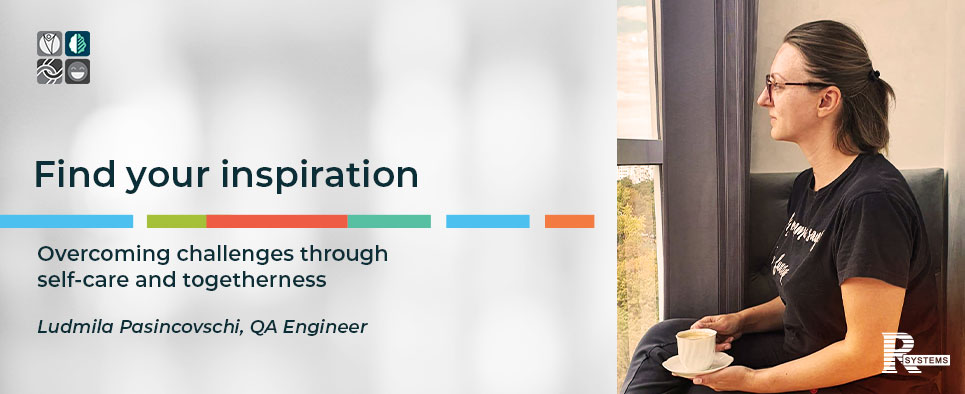
October 10th marked World Mental Health Day – an opportunity for us to reflect on our emotions, embrace a sense of community, and start conversations around important topics, such as stress, self-doubt, and perfectionism.
Stress and self-doubt are something that many of us have experienced at least once at work and our colleague Ludmila Pasincovschi was kind enough to have an open discussion with us about the challenges she faced in the past, and how she managed to overcome them though self-care and help from her team.
Now a QA Engineer at R Systems, Ludmila worked as a mechanical engineer for ten years, designing various mechanical devices, tools, and machines. When she had the opportunity to take a manual QA course and change her career, she immediately said yes, and from there to the R Systems QA Academy there was only one step.
“I don’t regret changing careers now, but back then it was quite a challenge. I was suddenly a 30-year-old student trying to learn. A lot of things were happening around me: I had a new job in an unfamiliar field, new colleagues, new environment, and this was also during the pandemic, which felt overwhelming.”
Tell us about the challenges you went through when you changed careers. What thoughts and feelings were you experiencing?
I had just changed my profession and it was a difficult period to manage. I was working on a project that involved talking to the client, which was something new to me. As a perfectionist and deeply self-critical person, accepting that I didn’t know everything from the beginning didn’t come easy. Some nights, I went to bed crying, thinking that I wasn’t good enough.
I didn’t have any “proof” for these negative thoughts. People were telling me I was doing a good job, but somehow I didn’t believe that and continued to doubt myself.
Where did these negative thoughts lead you?
One day, I simply told my manager that I didn’t believe this job was for me and that I wanted to quit. I told him what I believed, that I wasn’t good enough for the role, but he didn’t feel the same. On the contrary, he helped me understand that I was just overthinking, and that it was normal to have doubts. He even reassured me that working with international teams comes with language barriers and the occasional misunderstandings, and that I definitely wasn’t alone in this. This was the first step in changing my perspective.
What helped you overcome this situation?
My manager was very understanding and positive about the whole situation, and I think this is very important, to have someone you can come to for advice, without fearing that you’ll be judged. He also proposed to speak to a coach, and in the long run this was really helpful in changing my perspective and coping with my feelings.
I still remember the first time when I asked someone at work for help. I used to try and solve problems on my own and when I couldn’t find a solution, I was feeling really negative about myself. This time, I asked, and when I received an answer, I understood that it wasn’t such a big problem to begin with. I was simply overthinking. He didn’t blame me for anything, which was very important in a crisis situation.
Of course, I also had support from my friends and family. It’s important to surround yourself with people who listen and accept you the way you are, even though they can’t advise you on that particular problem at work.
What did you discover about yourself through coaching?
I learned to accept that I am human, that I need to be more gentle and caring about myself.
I’m feeling better now and whenever I’m facing a deadline or a problem at work, I ask myself “what’s the worst that can happen?”. Then I realize that things aren’t that bad and most of the time, the worst-case scenario I was imagining doesn’t come true. In short, I’m trying not to overthink and try to spend more time with friends and family, doing things that make me happy.
What is your situation at work now?
I’m excited and trying to learn as much as I can! 😊 I try to have a good relationship with my team, and whenever there’s time pressure, I try to calm myself and do my best without stressing too much. I understand now that stressing and overthinking won’t help me work faster – on the contrary. I try to take things step by step and ask for help when I need it. In the past, I used to work on my own, but now I’m more comfortable asking for help when I need it.
You mentioned that you are now more caring about yourself. Can you tell us more about that?
Sure. I call these little habits “giving yourself a moment of care”. These can be anything, like making myself a cup of coffee or tea, and taking a few minutes just for myself. When I’m working and I have a lot of tasks, I stop for a few minutes, I go somewhere where I can be alone, and just enjoy it. Before I know it, ideas and solutions start to pop into my head.
If you could write a letter to yourself in the past, back when you were experiencing these challenges, what advice would you give yourself?
To care about myself more, to give myself more time. We try to do everything perfectly and we often forget about ourselves, and now I understand that this is the most important thing. Nobody’s perfect, you need to admit this and live with it. When you can’t stop striving for perfectionism, just be perfect for yourself. If you manage to be good enough to yourself, everything will be alright.
“When you can’t stop striving for perfectionism, just be perfect for yourself.”